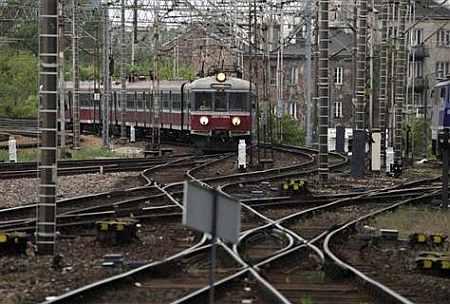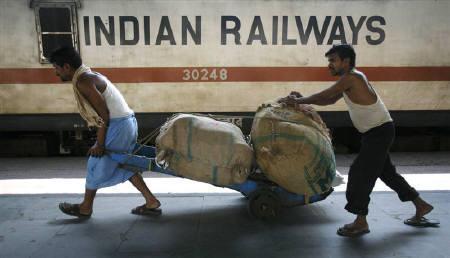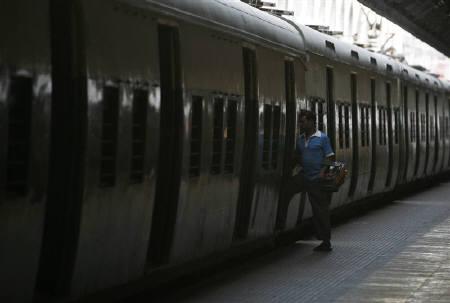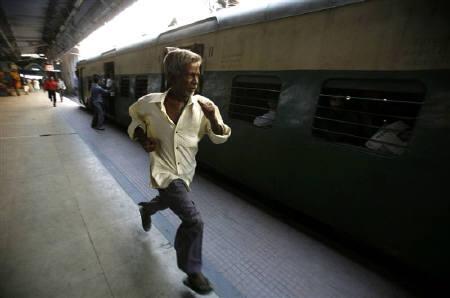Photographs: Kacper Pempel/Reuters Disha Kanwar in New Delhi
With the latest diesel price rise, coming after a rollback of most of the earlier proposals for a passenger fare increase, Indian Railways' operational surplus is expected to come down by 24 per cent, to Rs 11,707 crore (Rs 117.07 billion) in 2012-13 as against the Rs 15,557 crore (Rs 155.57 billion) anticipated at the beginning of the financial year.
Internal resource generation might come down by Rs 3,850 crore (Rs 38.5 billion). Internal resource is the amount that is spent from the various funds for the investment purpose.
Of that, Rs 3,150 crore (Rs 31.5 billion) will be on account of the roll back of fares. Besides, the railways will have to bear an additional burden of around Rs 700 crore (Rs 7 billion) because of the diesel rise of of Rs 5 per litre, leaving it with even less for investing in planned expenditure.
...
Diesel adds to railways' blues
Photographs: Parth Sanyal/Reuters
IR consumes about 2,500 million litres of diesel annually to run its fleet of 4,500-odd diesel locomotives, hauling both freight and passenger trains.
It paid about Rs 18,000 crore (Rs 180 billion) during 2011-12 towards its fuel bill, which keeps increasing every year due to addition of new services and more freight haulage. Roughly, around 50 per cent is paid each for diesel and electricity.
Minister Mukul Roy had rolled back the rise in passenger fares announced by his predecessor, Dinesh Trivedi, except for those in the AC-1 and AC-2 classes. The combined impact of these moves would be to hit the operational surplus by 24 per cent, all the fund balances by 20 per cent and expected hit on the plan size by 6 per cent.
...
Diesel adds to railways
Photographs: Parth Sanyal/Reuters
The plan outlay might be cut by six per cent, to Rs 56,250 crore (Rs 562.50 billion). The earlier budget was for an annual plan outlay of Rs 60,100 crore (Rs 601 billion).
The reassessed plan size is expected to be financed by Gross Budgetary Support of Rs 24,000 crore (Rs 240 billion), internal resources of Rs 14,200 crore (cut from Rs 18,050 crore), extra budgetary resources of Rs 16,050 crore (Rs 160.5 billion) and Rs 2,000 crore (Rs 20 billion) from the Railway Safety Fund.
With less money in the kitty, IR has cut its planned spending (appropriation) on asset replacement by about 20 per cent. It had earlier targeted to spend Rs 19,990 crore (Rs 199.9 billion) under four funds, including the Railway Safety Fund, this year from Rs 10,203 crore (Rs 102.03 billion) in 2011-12.
...
Diesel adds to railways
Photographs: Rupak De Chowdhuri/Reuters
The railways operate various funds to meet the requirement of asset acquisition, construction, replacement and renewal, as well as pension payments.
These funds are fully or partially financed by railway revenue, budgetary support by the central government or market borrowings, if needed.
The railways maintain a Depreciation Reserve Fund for replacement and renewal of old assets.
...
Diesel adds to railways' blues
Photographs: Parth Sanyal/Reuters
Appropriation to this is met from revenues and a contribution is made by production units in respect of the depreciation of their assets.
"The railways appropriate to this fund on a need-cum-availability basis instead of doing so in a scientific manner in consideration of the historical cost, expected useful life and expected residual life of the asset," said a rail official.







article